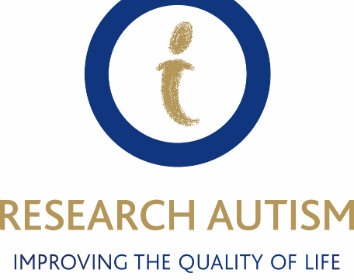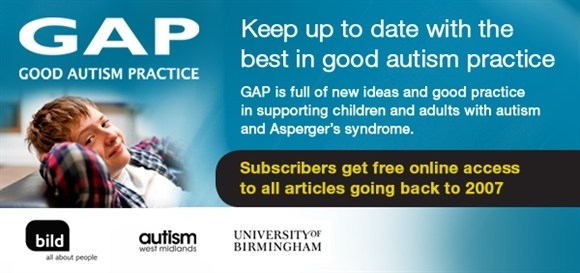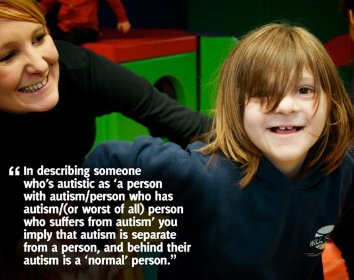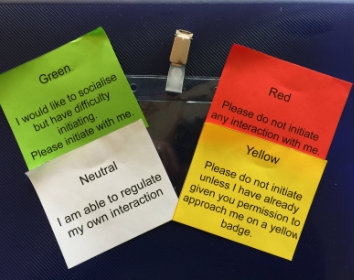Share Magazine Winter 2015
If it's good enough for Cherie Blair...The Cygnet life-coaching and mentoring programme for adults with autism
20/10/2015
Richard Mills
In 2009, Research Autism organised and conducted a Collaborative Autism Research Forum entitled Successful Futures for Adults with Autism. At this meeting adults with a diagnosis of autism were invited to talk about the systems of support that were available to them or that they would find helpful.
There was a consensus among this group that the existing forms of social support were not meeting their needs. Whereas social groups enjoyed a mixed response, the majority of those attending expressed particularly negative feelings about befriending as something that had not been helpful to them. Some said it had been their parent’s idea. Others reported that befrienders had either lost interest or moved away. One young woman was distressed to discover that her befriender was paid expenses. Problems with matching meant either no befrienders were found or they were paired with people with whom they had little in common. A view was expressed that friendships around shared interests were perfectly achievable for many autistic people but that a befriending arrangement often lacked this and seemed fairly meaningless for both parties. Participants were at pains to point out that for some autistic people befriending might work well – just not for them. What was needed, it was suggested, was a life coach or mentor working on a time-limited basis to help achieve specific goals or address specific points of concern. As one delegate put it ‘Cherie Blair has one –why not me?’
Following the meeting a group of adults, all with a diagnosis of autism or Asperger Syndrome, met to scope the project. The group came up with the name ‘Cygnet’ and were quite specific as to what it should and should not be. Their vision included a training programme for mentors and a manual of ‘how to do it’. It was also felt to be important that autistic people could themselves mentor other autistic people.
People should have the choice. It was acknowledged that circumstances would differ from individual to individual: one person might want to understand a ‘neurotypical’ perspective on a social situation, another might want to learn how an autistic person coped with a particular challenge and what had worked for them.
There was agreement that whatever was put in place would be systematically evaluated and a pilot would be developed. If successful, the scheme could be made more generally available and paid for by the individual, either through benefits or earnings. If unsuccessful the scheme could be thrown in the bin or modified.
The group provided a steer on how the programme would operate:
“Young people and adults with autism frequently fail to reach their academic and social potential or get into difficulties because they do not understand how others think or behave. Consequently, they do not know how to successfully manage their relationships with them. This is a result of the core difficulties of autism which include severe communication or language problems and which are frequently compounded by a lack of confidence, anxiety, physical and or mental health problems and differences in sensory processing.”
They described the type of service that they felt was needed as follows:
“Life-coaching or mentoring services that will help the young person with autism navigate and understand the world through sharing first-hand knowledge and experience of the world and a joint approach to problem solving. It differs from befriending and advocacy in that it would be time-limited and goal-directed – a professional service.”
The group believed that a mentoring programme would be a ‘low-cost, socially valid’ service that would have significant benefits for the physical and mental health and wellbeing of adults with autism. Importantly, they felt that it would reduce the demands on their families, and the need for other forms of health-based support or social care.
Our initial research found that although models of mentoring did exist, they were either not ‘autism-friendly’, or were not sufficiently well-described or consistent in their design or application. We found that often the term mentoring is conflated with befriending or advocacy. Such schemes as were described appeared unstructured, open-ended and lacking in focus. None had been systematically evaluated. We concluded from this preliminary review that there was no existing model that was suitable for use with autistic people. In some cases we felt that mentors and mentees were in fact made vulnerable.
An open call went out for academic institutions to establish and evaluate the impact of the scheme. Professor Simon Baron-Cohen, Director of Cambridge University’s Autism Research Centre, and Dr Nicola Martin, Head of the Education Research Centre at London South Bank University (LSBU), were successful.
Funding and ethical approval were secured to enable the project to launch in 2014. The project is supported and overseen by Richard Mills and Simon Baron-Cohen. The programme is delivered by two Research Assistants at LSBU on a job-share basis. One, Damian Milton, is himself on the autism spectrum. The interview panel contained two autistic members and the advisory panel also comprises three autistic members.
This project is designed to offer goal-directed and time-limited mentoring to 12 adults with a diagnosis of autism. Mentors will be recruited and include autistic adults. They will be vetted, trained and matched with those requiring a mentor. Each participant will receive half a day’s mentoring per week over a six-month period, reflecting the view of those consulted that a short period of mentoring would be more effective for them. Six months will also be attractive to those who fund and commission services and who might have been deterred by an open-ended commitment.
Evaluations and Outcomes
Evaluation is essential to facilitate accurate replication and dissemination of the scheme, as well as informing future research. Evaluation will be undertaken firstly using measures determined on an individual basis. For example, if an outcome specified by the participant is to get a job, this will be recorded as an outcome measure for that person. Other outcome measures might include reducing personal stress, handling criticism, managing conflict, joining a club or society, undertaking a course or leisure pursuit, or living independently. Goal setting will be through negotiation, and follow-up decided on an individual basis.
Secondly, changes in participants’ wellbeing will also be measured using an extensively validated tool, the Personal Wellbeing Index, developed by Robert Cummins and the International Wellbeing Group at Deakin University in Melbourne. This measure has been standardised and shown to be useful in assessing quality of life in autistic and non-autistic populations, and in allowing intra-country and international comparisons to be made.
Outcomes will be measured against the situation each participant was in at the starting point of the project (pre-intervention) thus using the participants as their own controls. Their progress will be assessed at the end of the mentoring period, and again six months after the intervention ends. The team will be recording and analysing qualitative data from post-mentoring interviews and reflective logs, and triangulating that with the quantitative data to look for potential indicators as to why people either felt they
benefited or didn’t.
At the end of the pilot we will have put in place, and evaluated, an intervention that was designed by the autistic and wider autism community. Moreover, we will have evidence as to whether this model is helpful, how it can be applied, and how it can be replicated. If mentoring proves to be successful, the output will be a model of low-cost ‘autism-friendly’ support that is acceptable to, and accessible by, the autistic community. Through the development of a manual and training, the model will be able to be replicated and rolled out nationally through new community support arrangements and personal budgets; throughout universities where transition difficulties can be critical; and throughout the UK corporate community, where success or failure of adults on the autism spectrum often depends on this type of intervention.
RESOURCES AND LINKS





